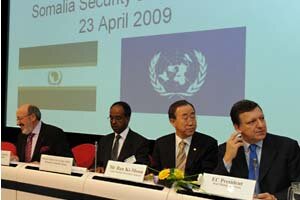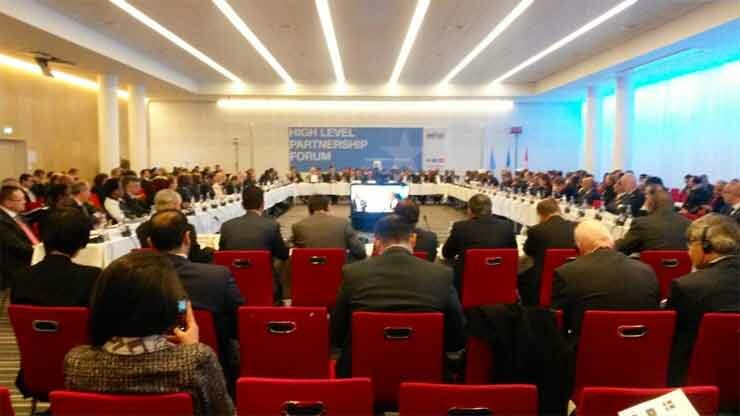EU poses as Somalia’s white knight… …but hides its own dirty hands

From left to right: Louis Michel, Mohamed Abdullahi Omaar, Somali FM, Ban Ki-moon, UN Secretary General and EU Commission President José Manuel Barroso Photo © European Communities, 2009
Radio Netherlands — A meeting billed as a donor conference for Somalia has tried to punch high above its weight by promising to help the new government end poverty and insecurity. But the EU’s efforts are largely driven by its own commercial interests to stop piracy and come after decades of disengagement and illegal activities off the coast of Aden.
There was no shortage of confidence-boosting talk at Thursday’s meeting in Brussels, with the UN Secretary General and the European Commission President both talking up the prospect of a “new chapter” and a “brighter future” for Somalia.
Absence of rule
Drawing breath, Ban Ki-moon and José Manuel Barroso also admitted that it would “not be easy” to stabilise Somalia give its long list of ills, from poverty to absence of rule of law, but hoped that the donation of 230 million euros would go some way to help train up more police and security forces there. Yet Neil Campbell of the International Crisis Group warns that EU’s ambitions will fail unless it takes a far deeper and longer-term approach that goes beyond its immediate need to solve the growing piracy problem:
“The EU in the past looked at Somalia as a failed state beyond help. The last state to be looked at in this way was Afghanistan, which then became an exporter of violence. The same will happen with Somalia if we continue look at it as a lost cause and just through the piracy lens, then we won’t solve the potential for it to export violence.”
|
What’s been pledged? |
|
Corruption
Mr Campbell also explains that much of the money risks being squandered in the absence of credible state institutions in Somalia: “The problem is how will this money be distributed once it gets there, if there is no internal governance? You risk increasing corruption and other worst-case scenarios.”
The EU itself does not have a clean reputation in the region. NGOs have long accused EU countries of dumping large quantities of toxic waste off the Somali coast and just this month, allegations that European companies have been fishing there illegally have resurfaced.
Illegal fishing
The Somali fisheries minister announced that over 200 illegal fishing vessels, most of them owned by EU companies, were active in Somali waters. Oceana, an ocean conservation group, says European trawlers deprived Somali fishermen of at least €100 million in lost revenue per year up until 2006, when the piracy problem reduced their activities. “But it’s still a big issue,” says Oceana’s Anna Schoer, adding that European vessels often disguise their country of origin by using foreign flags or “flags of convenience.”
“The tuna that is in Somalia’s waters is very valuable and is exported worldwide and Somali people must benefit from this. We must stop robbing the Somali people of the income they could have from their fish”, says Ms Schoer, adding that the EU’s anti-piracy naval mission off the coast of Aden, known as Atalanta, should monitor this problem.
On Wednesday, EU Fisheries Commissioner Joe Borg said he had “no evidence” of widespread cases of illegal fishing but was monitoring the situation.
No quick fixes
There are no quick fixes for Somalia but Thursday’s meeting was at least an encouraging sign that the international community is committed to staying the course.
Washington has nominated a special envoy to the region, Richard Carter. And the United Nations is reportedly considering setting up a special court to try Somali pirates.
NATO, which has four ships off the Somali coast, is also this week looking at stepping up its own military efforts there. Next month, US Secretary of State Hillary Clinton will also host a major Somalia conference.
Sheikh Sharif Ahmed
Many European leaders believe that President Sheikh Sharif Ahmed,a former Islamist rebel leader, offers the best hope in years of restoring stability and of drawing in more radical parties into a coalition.
“This is an extremely important conference because it is going to contribute to a solution to the problems of Somalia,” Ahmed told reporters in Brussels. “We will do everything we can so that Somalia becomes a beacon of peace.”
Comments
comments
 Calendar
Calendar



































